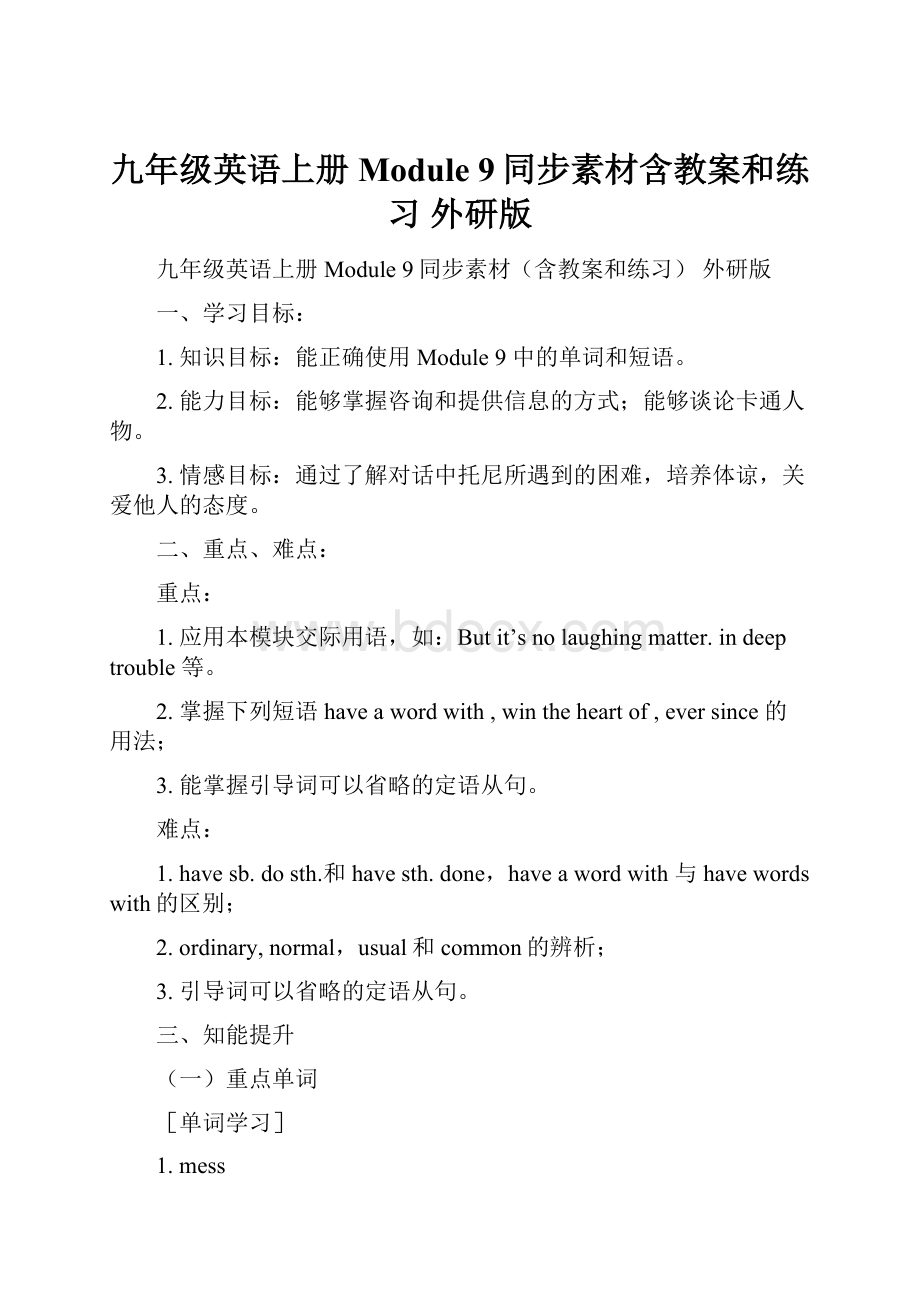九年级英语上册 Module 9同步素材含教案和练习 外研版.docx
《九年级英语上册 Module 9同步素材含教案和练习 外研版.docx》由会员分享,可在线阅读,更多相关《九年级英语上册 Module 9同步素材含教案和练习 外研版.docx(19页珍藏版)》请在冰豆网上搜索。

九年级英语上册Module9同步素材含教案和练习外研版
九年级英语上册Module9同步素材(含教案和练习)外研版
一、学习目标:
1.知识目标:
能正确使用Module9中的单词和短语。
2.能力目标:
能够掌握咨询和提供信息的方式;能够谈论卡通人物。
3.情感目标:
通过了解对话中托尼所遇到的困难,培养体谅,关爱他人的态度。
二、重点、难点:
重点:
1.应用本模块交际用语,如:
Butit’snolaughingmatter.indeeptrouble等。
2.掌握下列短语haveawordwith,wintheheartof,eversince的用法;
3.能掌握引导词可以省略的定语从句。
难点:
1.havesb.dosth.和havesth.done,haveawordwith与havewordswith的区别;
2.ordinary,normal,usual和common的辨析;
3.引导词可以省略的定语从句。
三、知能提升
(一)重点单词
[单词学习]
1.mess
【用法】n.杂乱,混乱(可数名词,通常用单数形式)
【例句】Thewholesituationisamess.整个情况都是一团糟。
常用短语:
beinamess乱糟糟,杂乱不堪
makeamess把……弄糟,把……搞得一塌糊涂
【例句】1.Theroomwasinamess.
2.Thekidsmadeamessinthebathroom.
【考查点】词义理解
【易错点】翻译时易漏掉a。
【考题链接】他把这事办得一塌糊涂。
Hehas______________________________________ofthejob.
答案:
madeamess.
解题思路:
此题考查makeamess的翻译,这里要翻译的是“把……办得一塌糊涂”,由于前面有has,所以make要用其过去分词形式,故填写madeamess。
2.lead
【用法】v.领导
【例句】Ifyoulead,I’llfollow.
短语:
leadtheway领路,带路
【例句】Sheledthewaytothemeetingroom.
【考查点】词义理解及lead的过去式和过去分词。
【易错点】lead的过去式和过去分词易写错。
【考题链接】
他刚才领我们到了花园。
He____________________________thegardenjustnow.
答案:
l
edusto。
解题思路:
此题考查lead的用法,由于所给的时间是justnow,要用一般过去时,故填写ledusto。
3.common
【用法】adj.常用的,常见的
【例句】JacksonisacommonEnglishname.
【考查点】common,ordinary,usual和normal的辨析
辨析:
common,ordinary,usual和normal:
common:
意为"普通的","平常的",强调“常见的”。
反义词是uncommon,“罕见的”
如:
Coldsarecommoninwinter.感冒在冬天很常见。
ordinary:
指“平常的”、“普通的”、“平淡无奇的”,指人的相貌普通常用ordinary修饰,反义词是great“伟大的”;此外,ordinary后面常跟名词。
如:
TomSawyerwasanordinaryAmericanboywhokeptgettingintotrouble.
汤姆·索耶是个常常惹是生非的普普通通的美国男孩。
usual:
意为“通常的”,“习惯性的”,“惯常的”,“惯例的”。
反义词是unusual“不寻常的”。
如:
Hearrivedlaterthanusual.他到得比平常晚一些。
Iwillseeyouattheusualtime.我在老时间来看你。
normal:
指“正常的”、“正规的”、“标准的”,用于描述预料之中、正常、常规的事物。
反义词是abnormal“异常的”。
如:
Thedoctorsaidthechild'stemperaturewasnormal.医生说孩子体温正常。
Weareopenduringnormalworkinghours.我们在正常的上班时间都开门营业。
【易错点】common,ordinary,usual和normal易混淆。
【考题链接】
Thebirdsarevery_______________here.
A.commonB.ordinaryC.normalD.usual
答案:
A。
解题思路:
此题考查common,ordinary,usual和normal的辨析。
此句意为“这些鸟在这儿很常见”,故选A。
4.experience
【用法1】n.经历,体验
experience作“经历”解时,是可数名词,作“体验,经验”解时,是不可数名词。
【例句】1.Hehasovertenyears’teachingexperience.他有十多年的教学经验。
2.LivinginAfricaisquiteanexperience.在非洲生活是一次不同寻常的经历。
【用法2】v.经历,经受,遭受
【例句】Everyoneexperiencestheseproblemsatsometimeintheirlives.
每个人在人生的某个阶段都会经历这些事情。
【考查点】词义理解。
【易错点】作名词用时单复数不明确。
【考题链接】
Ihadsomeinterestinge______________________.(根据句意和首字母填写单词)
答案:
experiences。
解题思路:
此题考查experience作名词的用法。
此句意为“我有一些有趣的经历”,由于experience作“经历”解时,是可数名词,前面又有some,故填写experiences。
[即学即练]
1.Shehastaughtfor22years.Shehasmuche____________________inteaching.(根据句意和首字母填写单词)
2.Yourbooksandmagazinesarealmostinam_______________,goandputtheminorder.(根据句意和首字母填写单词)
3.Sorry,I’mnewhere.Couldyoul__________________thewayforme?
(根据句意和首字母填写单词)
4.Heisalittlemanwith_________________looking.
A.commonB.normalC.ordinaryD.usual
(二)重点短语
[短语学习]
1.haveawordwith
【用法】“和某人说几句话”
【例句】MayIhaveawordwithyou,Tom?
注意:
havewordswith意思是“与……吵架”。
【例句】Heoftenhaswordswithhisclassmates,sonoonelikeshim.
【考查点】词组本意。
【易错点】不注意haveawordwith和havewordswith的区别。
【考题链接】
我父亲想和我的老师说几句话。
Myf
atherwantsto_________________________________myteacher.
答案:
haveawordwith
解题思路:
此题考查“和某人说几句话”的翻译,不要因为“说几句话”而写成havewordswith,应填写haveawordwith。
2.wintheheartof
【用法】“赢得……的心”
【例句】Thesecartoonstorieshavewontheheartsofchildren.
=Thesecartoonstorieshavewonthechildren’shearts.
【考查点】词组本意。
【易错点】win的过去式和过去分词以及heart的单复数。
【考题链接】
他们赢得了全世界人的心。
Theyhave____________________________________peopleallovertheworld.
答案:
wontheheartsof。
解题思路:
此题考查wintheheartof的翻译,由于前面有have,所以要用win的过去分词,由于people是复数,故heart也要用复数,故填写wontheheartsof。
3.eversince
【用法】“自从,从……一直以来”
eversince引导时间状语从句,主句常用现在完成时,并且主句的谓语要用持续性动词,但从句则要用一般过去时。
【例句】HehasbeenavolunteerinWenchuaneversincelastmonth.自从上个月起他一直在汶川做志愿者。
【考查点】词组本意。
【易错点】主句和从句的时态易弄错。
【考题链接】
He____________________fromQuanzhoueversincehe________school.
A.didn’tleave,hasleftB.hasn’tleft,leftC.hasn’tbeenaway,left
答案:
C。
解题思路:
此题考查“eversince”的用法,由于eversince引导时间状语从句,主句用现在完成时,从句用一般过去时,因此排除A。
又由于主句的谓语要用持续性动词,而left是短暂性动词,beaway是持续性动词,故选C。
4.havesth.done
【用法】“让/叫/使/请别人做某事”
宾语sth.后面用过去分词作宾语补足语,说明sth.与过去分词表示的
动作之间是被动关系。
【例句】1.Wehadthemachinemendedjustnow. 我们刚才请人把机器修好了。
2.Hehashadhishaircut. 他(请人给他)理发了。
注意:
“havesb.dosth.”意为“让/叫/使某人做某事”。
此结构中的have是使役动词,sb.作宾语,其后的dosth.是省去to的动词不定式作宾语补足语。
【例句】Thebossoftenhasthemworkfor14hoursaday.老板经常要他们一天工作14个小时。
【考查点】havesb.dosth.和havesth.done两个短语主动与被
动的区别。
【易错点】havesb.dosth.和havesth.done的意思混淆。
【考题链接】
Thepatientisgoingtohavehistemperature_________.
A.takeB.takenC.totake
答案:
B。
解题思路:
此题考查的是havesb.dosth.和havesth.done的辨析,此句意为“这个病人准备叫人量体温”,“叫别人做某事”应用“havesth.done”,故选B。
5.indeeptrouble
【用法】“惹大麻烦,倒霉”
beintrouble意为“处于困难或危险中”,表示状态。
trouble前可用deep,great等描述。
【例句】IfTonyisindeeptrouble,wewillhelphim.如果托尼惹了大麻烦,我们会帮助他的。
【考查点】beintrouble的用法。
【易错点】trouble前的修饰词易用错。
【考题链接】如果你不告诉他真相,你会有大麻烦的。
Ifyoudon’ttellhimthetruth,you_________________________________.
答案:
willbeindeeptrouble。
解题思路:
此题考查“有大麻烦”的翻译,由于从句用了一般现在时,所以主句要用一般将来时,故填写willbeindeeptrouble。
[即学即练]
1.她说她想和你说几句话。
Shesaidshewouldlike________________________________________you.
2.他想知道怎样赢得人心。
Hewantedtoknow____________________________________________people.
3.自从他搬到伦敦,我就一直没见过他。
_____________________he__________________London,Ihaven’tseenhim.
4.他已经叫人修理了自行车。
He___________________hisbicycle___________________.
5.他打碎了妈妈的眼镜,现在他有大麻烦了。
Hebrokemom’sglasses.Nowhe__________
____________________________.
(三)重点句型
[句型学习]
1.Butit’snolaughingmatter.
【用法】“但这可不是开玩笑的事”
matter用作可数名词,意为“事情,问题,情况”等。
nolaughingmatter表示的否定强度比notalaughingmatter强得多,表示不仅仅不是好笑的事情,并且是十分严肃的问题。
【例句】
1.It’snolaughingmatter,I’mserious.
2.That'sonlyamatteroftime.那只是个时间问题。
【考查点】语境运用。
【易错点】意思不明确。
【考题链接】
—Oh,dear!
Ibrokemother’scup.WhatshouldIdo?
—Don’tbenervous.Justacup.
—__________________________________.It’smother’sfavourite.
A.IthinksoB.I’mafraidsoC.Butit’snolaughingmatter
答案:
C。
解题思路:
此题考查情景对话。
根据后面“It’smother’sfavourite.”“这是妈妈最喜欢的杯子”可推断应选C。
2.定语从句(引导词的省略)。
【用法】在英语中,如果定语从句的引导词在从句中作宾语就可以省略,无论从句修饰的是人还是物。
【例句】
(1)Doyougotothetalk(that/which)thefamouscartoonistgaveatyourschool?
那位著名的漫画家去你的学校开讲座,你去听了吗?
(2)Theyoungman(who/that)wemetatthegateismybrother.我们在门口碰到的年青人是我哥哥。
引导词作宾语就可以省略,因为省略后的从句仍然是完整的,有主语,谓语,我们仍然可以分辨出哪部分是定语从句。
但是,如果引导词在从句中作主语就不可以省略,否则会造成结构混乱,我们就无法分清楚从句从什么地方开始,影响表达。
如:
I’dliketohaveateacherwhowasacartoonist.我喜欢有一位当过漫画家的老师。
【考查点】关系代词that,which和who可省略的情况。
【易错点】不清楚关系代词that,which和who作宾语还是主语。
【考题链接】
Thebook_________________heboughtyesterdayisveryinteresting.
A./B.whoC.what
答案:
A。
解题思路:
此题考查关系代词的用法。
由于先行词是物thebook,先排除B,what不是关系代词,也被排除;此处关系代词在从句中作宾语,可省略,故选A。
[即学即练]
1.Theman_________gaveusatalkonscienceyesterdayisafamousscientist.
A.whoB.whomC.which
2.Thisistheschool___________youvisitedlastmonth.
A./B.whoC.where
3.I’vereadthenewspaperthat_____________theimportantnews.
A.
carryB.carriesC.carrying
4.Thecity___________shelivesinisveryfaraway.
A.whereB.whoC./
预习导学
上学期期中复习
复习内容:
单词:
复习Module1-9的重点单词。
短语:
复习Module1-9的重点短语。
语法:
1.被动语态。
2.构词法
3.that,which和who引导的定语从句。
同步练习
(答题时间:
45分钟)
一.单项选择:
1.I’dliketohaveawordwith___________.
A.heB.hisC.him
2.Canyouhelpher?
She’s_______deeptrouble.
A.inB.onC.at
3.Thecake________weatelastnightwasmadebymymother.
A.whoB.whichC.what
4.Thebaby________wearelookingafterisveryhealthy.
A.whatB.whichC./
*5.Beijingisthe29thcitythat_____________theOlympicGames.
A.holdB.holdsC.haveheld
*6.Mywatchdoesn’twork.Imusthaveit_______________.
A.repairedB.repairC.repairing
7.Theyoungmanwho______sittingbesideMrLinismybrother.
A.isB.areC.has
8.I______________hereversinceshewasababy.
A.wasknowingB.knewC.haveknown
9.Ihadaveryunusual___________yesterday.IsawaUFOlandinfrontofme.
A.decisionB.testC.experience
10.Ittellsastoryofamonkey____________leadsagroupofmonkeys.
A./B.whoC.which
*11.I’llhavesomeone____________myhairtomorrow.
A.cutB.tocutC.cutting
*12.Surfingis______________insuchacountrywithsomanyandsobigseabeaches.
A.commonB.ordinaryC.normal
13.Thegirl__________oftenhelpsmewithmyEnglishisfromEngland.
A./B.whoC.which
14.Hewasthefirstperson_____________passedtheexam.
A./B.whichC.that
*15.Thisistheschool_________________Istudiedtenyearsago.
A.whereB.thatC.which
*二.完形填空:
Deargrandma,
Howisitgoing?
Ihopethatgrandpais
(1)now.Iwassorrytohearthathehada
(2)lastweek.Ihopeyouareingoodhealth.
Thingsarefinenow.Ifinishedmyend-of-yearexamslastweekandgotmy(3)cardtoday.Ialwaysget(4)whenIseetheenvelopefromschoolinthemail,but(5)IdidOKthistime.Ihadareallyhard(6)withsciencethissemester,andIwasn'tsurprise
dtofindthatmyworstreportwasfrommyscienceteacher.ShesaidIwaslazy,whichisn't(7).It'sjustthatIfindsciencereallydifficult.(8)disappointingresultwasinhistory.MyhistoryteachersaidIcoulddobetter.Thegood(9)isthatmymathteachersaidIwashard-working.AndmySpanishteachersaidmylistening